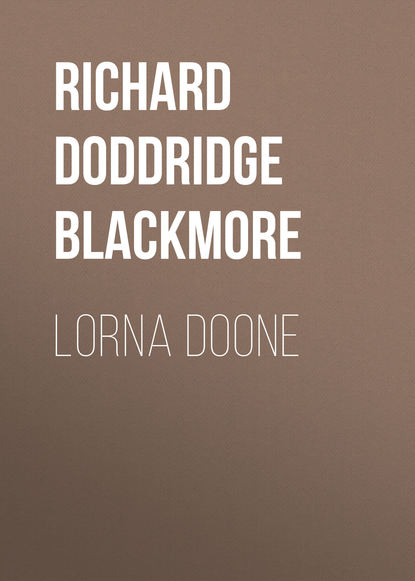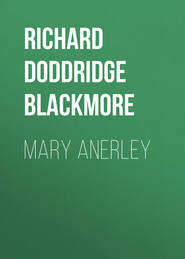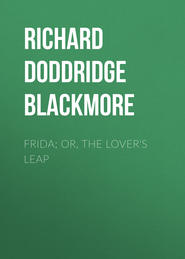По всем вопросам обращайтесь на: info@litportal.ru
(©) 2003-2024.
✖
Lorna Doone
Настройки чтения
Размер шрифта
Высота строк
Поля
When I came to myself again, my hands were full of young grass and mould, and a little girl kneeling at my side was rubbing my forehead tenderly with a dock-leaf and a handkerchief.
“Oh, I am so glad,” she whispered softly, as I opened my eyes and looked at her; “now you will try to be better, won’t you?”
I had never heard so sweet a sound as came from between her bright red lips, while there she knelt and gazed at me; neither had I ever seen anything so beautiful as the large dark eyes intent upon me, full of pity and wonder. And then, my nature being slow, and perhaps, for that matter, heavy, I wandered with my hazy eyes down the black shower of her hair, as to my jaded gaze it seemed; and where it fell on the turf, among it (like an early star) was the first primrose of the season. And since that day I think of her, through all the rough storms of my life, when I see an early primrose. Perhaps she liked my countenance, and indeed I know she did, because she said so afterwards; although at the time she was too young to know what made her take to me. Not that I had any beauty, or ever pretended to have any, only a solid healthy face, which many girls have laughed at.
Thereupon I sate upright, with my little trident still in one hand, and was much afraid to speak to her, being conscious of my country-brogue, lest she should cease to like me. But she clapped her hands, and made a trifling dance around my back, and came to me on the other side, as if I were a great plaything.
“What is your name?” she said, as if she had every right to ask me; “and how did you come here, and what are these wet things in this great bag?”
“You had better let them alone,” I said; “they are loaches for my mother. But I will give you some, if you like.”
“Dear me, how much you think of them! Why, they are only fish. But how your feet are bleeding! oh, I must tie them up for you. And no shoes nor stockings! Is your mother very poor, poor boy?”
“No,” I said, being vexed at this; “we are rich enough to buy all this great meadow, if we chose; and here my shoes and stockings be.”
“Why, they are quite as wet as your feet; and I cannot bear to see your feet. Oh, please to let me manage them; I will do it very softly.”
“Oh, I don’t think much of that,” I replied; “I shall put some goose-grease to them. But how you are looking at me! I never saw any one like you before. My name is John Ridd. What is your name?”
“Lorna Doone,” she answered, in a low voice, as if afraid of it, and hanging her head so that I could see only her forehead and eyelashes; “if you please, my name is Lorna Doone; and I thought you must have known it.”
Then I stood up and touched her hand, and tried to make her look at me; but she only turned away the more. Young and harmless as she was, her name alone made guilt of her. Nevertheless I could not help looking at her tenderly, and the more when her blushes turned into tears, and her tears to long, low sobs.
“Don’t cry,” I said, “whatever you do. I am sure you have never done any harm. I will give you all my fish Lorna, and catch some more for mother; only don’t be angry with me.”
She flung her little soft arms up in the passion of her tears, and looked at me so piteously, that what did I do but kiss her. It seemed to be a very odd thing, when I came to think of it, because I hated kissing so, as all honest boys must do. But she touched my heart with a sudden delight, like a cowslip-blossom (although there were none to be seen yet), and the sweetest flowers of spring.
She gave me no encouragement, as my mother in her place would have done; nay, she even wiped her lips (which methought was rather rude of her), and drew away, and smoothed her dress, as if I had used a freedom. Then I felt my cheeks grow burning red, and I gazed at my legs and was sorry. For although she was not at all a proud child (at any rate in her countenance), yet I knew that she was by birth a thousand years in front of me. They might have taken and framed me, or (which would be more to the purpose) my sisters, until it was time for us to die, and then have trained our children after us, for many generations; yet never could we have gotten that look upon our faces which Lorna Doone had naturally, as if she had been born to it.
Here was I, a yeoman’s boy, a yeoman every inch of me, even where I was naked; and there was she, a lady born, and thoroughly aware of it, and dressed by people of rank and taste, who took pride in her beauty and set it to advantage. For though her hair was fallen down by reason of her wildness, and some of her frock was touched with wet where she had tended me so, behold her dress was pretty enough for the queen of all the angels. The colours were bright and rich indeed, and the substance very sumptuous, yet simple and free from tinsel stuff, and matching most harmoniously. All from her waist to her neck was white, plaited in close like a curtain, and the dark soft weeping of her hair, and the shadowy light of her eyes (like a wood rayed through with sunset), made it seem yet whiter, as if it were done on purpose. As for the rest, she knew what it was a great deal better than I did, for I never could look far away from her eyes when they were opened upon me.
Now, seeing how I heeded her, and feeling that I had kissed her, although she was such a little girl, eight years old or thereabouts, she turned to the stream in a bashful manner, and began to watch the water, and rubbed one leg against the other.
I, for my part, being vexed at her behaviour to me, took up all my things to go, and made a fuss about it; to let her know I was going. But she did not call me back at all, as I had made sure she would do; moreover, I knew that to try the descent was almost certain death to me, and it looked as dark as pitch; and so at the mouth I turned round again, and came back to her, and said, “Lorna.”
“Oh, I thought you were gone,” she answered; “why did you ever come here? Do you know what they would do to us, if they found you here with me?”
“Beat us, I dare say, very hard; or me, at least. They could never beat you.”
“No. They would kill us both outright, and bury us here by the water; and the water often tells me that I must come to that.”
“But what should they kill me for?”
“Because you have found the way up here, and they never could believe it. Now, please to go; oh, please to go. They will kill us both in a moment. Yes, I like you very much”—for I was teasing her to say it—“very much indeed, and I will call you John Ridd, if you like; only please to go, John. And when your feet are well, you know, you can come and tell me how they are.”
“But I tell you, Lorna, I like you very much indeed—nearly as much as Annie, and a great deal more than Lizzie. And I never saw any one like you, and I must come back again to-morrow, and so must you, to see me; and I will bring you such lots of things—there are apples still, and a thrush I caught with only one leg broken, and our dog has just had puppies—”
“Oh, dear, they won’t let me have a dog. There is not a dog in the valley. They say they are such noisy things—”
“Only put your hand in mine—what little things they are, Lorna! And I will bring you the loveliest dog; I will show you just how long he is.”
“Hush!” A shout came down the valley, and all my heart was trembling, like water after sunset, and Lorna’s face was altered from pleasant play to terror. She shrank to me, and looked up at me, with such a power of weakness, that I at once made up my mind to save her or to die with her. A tingle went through all my bones, and I only longed for my carbine. The little girl took courage from me, and put her cheek quite close to mine.
“Come with me down the waterfall. I can carry you easily; and mother will take care of you.”
“No, no,” she cried, as I took her up: “I will tell you what to do. They are only looking for me. You see that hole, that hole there?”
She pointed to a little niche in the rock which verged the meadow, about fifty yards away from us. In the fading of the twilight I could just descry it.
“Yes, I see it; but they will see me crossing the grass to get there.”
“Look! look!” She could hardly speak. “There is a way out from the top of it; they would kill me if I told it. Oh, here they come, I can see them.”
The little maid turned as white as the snow which hung on the rocks above her, and she looked at the water and then at me, and she cried, “Oh dear! oh dear!” And then she began to sob aloud, being so young and unready. But I drew her behind the withy-bushes, and close down to the water, where it was quiet and shelving deep, ere it came to the lip of the chasm. Here they could not see either of us from the upper valley, and might have sought a long time for us, even when they came quite near, if the trees had been clad with their summer clothes. Luckily I had picked up my fish and taken my three-pronged fork away.
Crouching in that hollow nest, as children get together in ever so little compass, I saw a dozen fierce men come down, on the other side of the water, not bearing any fire-arms, but looking lax and jovial, as if they were come from riding and a dinner taken hungrily. “Queen, queen!” they were shouting, here and there, and now and then: “where the pest is our little queen gone?”
“They always call me ‘queen,’ and I am to be queen by-and-by,” Lorna whispered to me, with her soft cheek on my rough one, and her little heart beating against me: “oh, they are crossing by the timber there, and then they are sure to see us.”
“Stop,” said I; “now I see what to do. I must get into the water, and you must go to sleep.”
“To be sure, yes, away in the meadow there. But how bitter cold it will be for you!”
She saw in a moment the way to do it, sooner than I could tell her; and there was no time to lose.
“Now mind you never come again,” she whispered over her shoulder, as she crept away with a childish twist hiding her white front from me; “only I shall come sometimes—oh, here they are, Madonna!”
Daring scarce to peep, I crept into the water, and lay down bodily in it, with my head between two blocks of stone, and some flood-drift combing over me. The dusk was deepening between the hills, and a white mist lay on the river; but I, being in the channel of it, could see every ripple, and twig, and rush, and glazing of twilight above it, as bright as in a picture; so that to my ignorance there seemed no chance at all but what the men must find me. For all this time they were shouting and swearing, and keeping such a hullabaloo, that the rocks all round the valley rang, and my heart quaked, so (what with this and the cold) that the water began to gurgle round me, and to lap upon the pebbles.
Neither in truth did I try to stop it, being now so desperate, between the fear and the wretchedness; till I caught a glimpse of the little maid, whose beauty and whose kindliness had made me yearn to be with her. And then I knew that for her sake I was bound to be brave and hide myself. She was lying beneath a rock, thirty or forty yards from me, feigning to be fast asleep, with her dress spread beautifully, and her hair drawn over her.
Presently one of the great rough men came round a corner upon her; and there he stopped and gazed awhile at her fairness and her innocence. Then he caught her up in his arms, and kissed her so that I heard him; and if I had only brought my gun, I would have tried to shoot him.
“Here our queen is! Here’s the queen, here’s the captain’s daughter!” he shouted to his comrades; “fast asleep, by God, and hearty! Now I have first claim to her; and no one else shall touch the child. Back to the bottle, all of you!”
He set her dainty little form upon his great square shoulder, and her narrow feet in one broad hand; and so in triumph marched away, with the purple velvet of her skirt ruffling in his long black beard, and the silken length of her hair fetched out, like a cloud by the wind behind her. This way of her going vexed me so, that I leaped upright in the water, and must have been spied by some of them, but for their haste to the wine-bottle. Of their little queen they took small notice, being in this urgency; although they had thought to find her drowned; but trooped away after one another with kindly challenge to gambling, so far as I could make them out; and I kept sharp watch, I assure you.
Going up that darkened glen, little Lorna, riding still the largest and most fierce of them, turned and put up a hand to me, and I put up a hand to her, in the thick of the mist and the willows.
She was gone, my little dear (though tall of her age and healthy); and when I got over my thriftless fright, I longed to have more to say to her. Her voice to me was so different from all I had ever heard before, as might be a sweet silver bell intoned to the small chords of a harp. But I had no time to think about this, if I hoped to have any supper.
I crept into a bush for warmth, and rubbed my shivering legs on bark, and longed for mother’s fagot. Then as daylight sank below the forget-me-not of stars, with a sorrow to be quit, I knew that now must be my time to get away, if there were any.
Therefore, wringing my sodden breaches, I managed to crawl from the bank to the niche in the cliff which Lorna had shown me.
Through the dusk I had trouble to see the mouth, at even the five land-yards of distance; nevertheless, I entered well, and held on by some dead fern-stems, and did hope that no one would shoot me.
But while I was hugging myself like this, with a boyish manner of reasoning, my joy was like to have ended in sad grief both to myself and my mother, and haply to all honest folk who shall love to read this history. For hearing a noise in front of me, and like a coward not knowing where, but afraid to turn round or think of it, I felt myself going down some deep passage into a pit of darkness. It was no good to catch the sides, the whole thing seemed to go with me. Then, without knowing how, I was leaning over a night of water.











